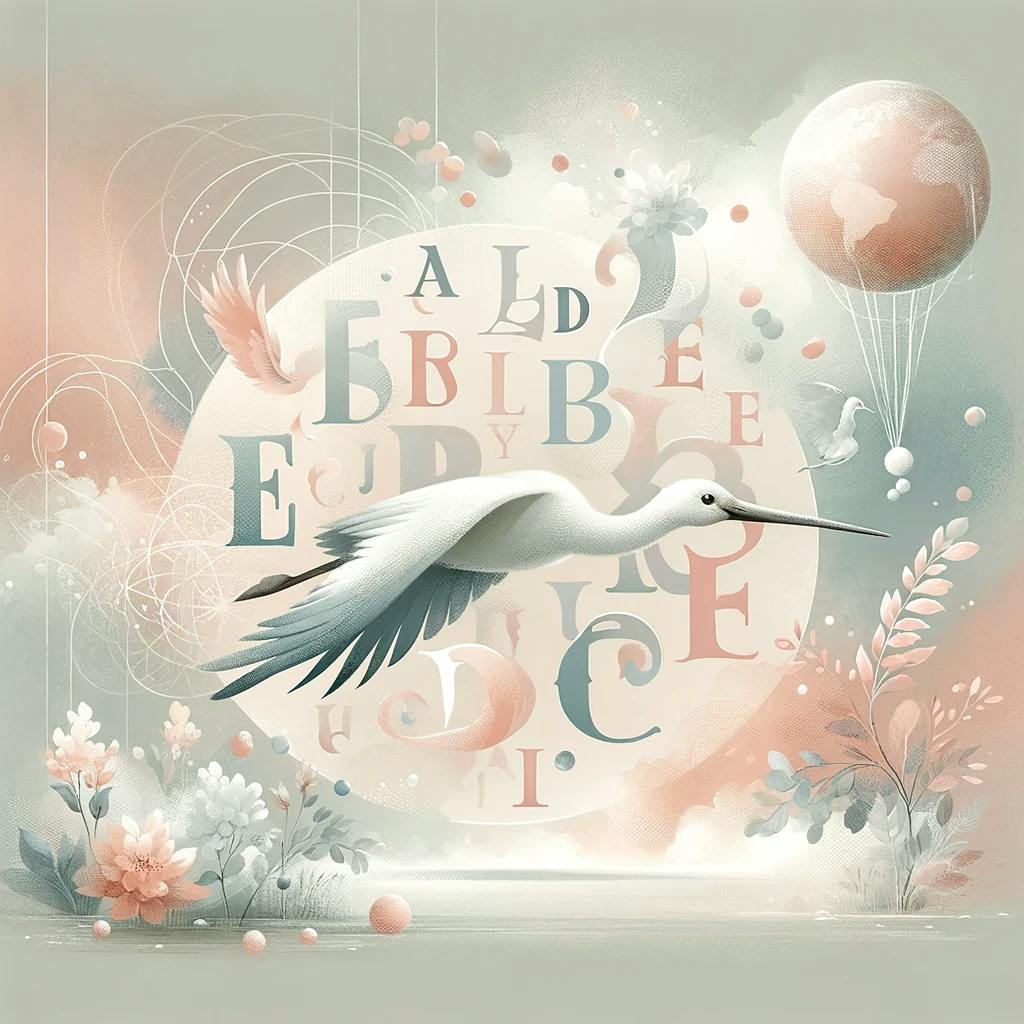The Legacy and Power of Names: An Exploration


Growing up, family gatherings always meant two things for me: hearty Scottish tales from my dad's side and vibrant South African stories from my mum's. Among the many narratives, I often wondered about the story behind my own name, 'Gareth'. One summer afternoon, while skimming through a family album, my dad mentioned that 'Gareth' has Celtic roots, hinting at our Scottish ancestry. It wasn't a name from legends or heroes but rather a reflection of the blend of cultures in our family.
This realisation got me thinking. Our names, often chosen before we've even opened our eyes to the world, carry subtle hints of our lineage, culture, and family history. They're our first introduction to the world and, in many ways, shape our interactions and identity. And while the meaning or origin of a name might not define us, it certainly adds a layer to our story. This led me to a broader contemplation: How significant is the role of our names in the grand narrative of our lives?
The Historical Weight of Names
Every time we introduce ourselves, our names echo stories from the past, painting vivid portraits of our ancestors' worlds. These aren't just labels; they're tales of professions, landmarks, and individual traits. Let's embark on a journey through time, using names as our guideposts.
Take the name "Logan", for instance. To the modern ear, it might conjure images of a clawed superhero battling foes in a dystopian future – yes, Wolverine from the X-Men series. It's a name that's surged in popularity recently, resonating with young parents who grew up in the era of comic book blockbusters. But did you know that long before Wolverine, the name "Logan" whispered tales of lush Scottish landscapes?
Delve into its Gaelic roots, and "Logan" translates to "little hollow". Picture the rolling Scottish highlands with their dells and valleys, places of refuge amidst rugged terrains. If your name was Logan centuries ago, it likely meant your ancestors lived near such a natural haven, connecting them intimately with the land.
But there's more to this name than just scenic beauty. The Logans of ancient Scotland were known for their valour. Legend speaks of Sir Robert Logan, who stood shoulder to shoulder with Sir William Wallace – the very inspiration behind the epic "Braveheart". They resisted the mighty English forces in the late 13th century, imbuing the name with a legacy of bravery and resistance.
So, for today's parents, naming their child "Logan" isn't just about contemporary coolness. It's also a nod to nature's serenity and historical tales of courage. It's an intricate blend of pop culture, natural splendour, and tales of yore.
This journey with "Logan" is a testament to the incredible stories our names carry. As we navigate through life, our names serve as silent narrators, recounting tales from bygone eras, places, and personalities. They're not just phonetic combinations; they're a rich tapestry of narratives, waiting for us to discover and cherish.
The Psychology of Names
Names are more than just labels; they're deeply intertwined with our psyche, influencing our personalities, careers, and even our daily social interactions. Over the years, psychologists and researchers have delved into the profound impact of names, unearthing fascinating insights that might make us rethink the power of our monikers.
Have you ever come across a florist named 'Lily' or a baker named 'Brown'? This isn't mere coincidence. The phenomenon, known as 'nominative determinism', suggests that our names can subtly push us towards specific professions or paths. A study from the New York University found that people, perhaps unconsciously, prefer jobs that match their names. The world of athletics provides a quirky example: Usain Bolt, the fastest man on earth, bears a surname eerily fitting for a sprinter.
But how does a name influence one's self-perception? Names, especially unique ones, come with their baggage. Individuals named 'Apple' or 'North' might constantly find themselves at the centre of attention, sparking curiosity and sometimes, unfortunately, ridicule. This can be a double-edged sword. While uniqueness can boost self-esteem and foster a strong individual identity, it might also lead to unnecessary explanations or corrections. On the flip side, those with more common names like 'John' or 'Emma' might find comfort in the familiarity but could also feel lost in a sea of similar monikers.
Furthermore, names can sometimes carry societal biases. A study from the American Psychological Association revealed that people make judgments about someone's socioeconomic status, personality, and even ethnicity based merely on their first name. Such biases can affect opportunities and interactions, underscoring the unconscious power names wield.
However, as we navigate the complexities of our names, it's essential to remember that they are just one facet of our multifaceted identities. While they might influence perceptions and choices, our destinies aren't etched in the letters of our names. Instead, they provide a starting point, a backdrop against which we paint our stories, making choices that define who we become.
Modern Naming Trends and Dynamics
There's an inexplicable magic about the ocean. Its vastness, its rhythmic dance with the shores, the way it carries stories from distant lands. Surfing has always been my escape, a way to connect with this elemental force. When my wife and I were expecting our daughter, our second child, we wanted her name to capture a sense of serenity, beauty, and nature. 'Eden' felt just right. A name that evokes images of pristine landscapes, harmony, and a paradise untouched by the chaos of modern life.
This personal connection with 'Eden' led us down the path of exploring the intricacies of naming in today's world. Pop culture, undoubtedly, has left its imprint. The popularity of names like 'Arya' or 'Elsa' resonates with tales and characters that have become cultural landmarks.
With technology knitting the world closer, names from various corners of the globe now feel right at home in any part of the world. It's a delightful mix to hear a 'Sofia' in Nairobi or an 'Akio' in London, mirroring our intertwined global community.
The rise of names like 'Jordan' and 'Alex', which seamlessly blend across genders, reflects a modern world breaking away from traditional confines. Nature, in its timeless allure, continues to inspire. Names like 'Luna', 'River', and of course, 'Eden', stand as testimonies to the beauty that surrounds us.
Then there are the trailblazers, parents who choose names that are unique, names that promise tales of their own. Think 'Zephyr' or 'Nova', evoking curiosity and wonder.
For us, naming our daughter 'Eden' was an ode to nature, to places of tranquillity and beauty. Names, after all, are more than just labels. They are stories, legacies, and in many ways, a window to our souls, capturing both personal journeys and the evolving tapestry of our times.
The Personal Journey of Embracing One's Name
Names are intimate reflections of our identity, our lineage, and often, our personal journeys. Embracing one's name, understanding its roots, and cherishing its significance can be a transformative experience.
Take Ethan, for instance. A friend from our shared surfing escapades, Ethan had always considered his name just another common moniker. It wasn't until he delved into his family's history that he discovered he was named after his great-grandfather, a brave soul who served during World War II. This revelation deepened Ethan's bond with his name, linking him to a past filled with valour and resilience.
Another poignant tale comes from Maya, a colleague from the early days of my career. Originally named 'Maithili', she adopted 'Maya' during her teens, aiming for a smoother integration into a western environment where her birth name often met with puzzled looks. However, a soul-searching trip to India in her late twenties made her reconnect with 'Maithili', recognising its lyrical beauty and the rich heritage it represented.
Embracing one's name is an act of self-empowerment. It's about understanding one's roots, accepting one's identity, and cherishing the tales that names embody. This journey, whether it involves rediscovering a name's significance or choosing to adapt it, is deeply personal and profound.
In a world where identities are multifaceted and ever-evolving, our names serve as steadfast anchors. They offer insights into our origins, the legacies we inherit, and the narratives we continue to craft. Through understanding and owning our names, we find clarity, pride, and a sense of belonging in the intricate web of our existence.
The Future of Naming
The future, in its vast uncertainty, has always been a captivating muse. When it comes to naming, we stand at a thrilling intersection of tradition and innovation. With globalisation blending cultures seamlessly and technology offering unprecedented tools, the future of naming promises to be as rich and diverse as our shared human tapestry.
One can't help but ponder: as we move further into the 21st century, how will names evolve? With families becoming more multicultural, we're likely to see names that draw from multiple heritages, reflecting a beautiful mosaic of cultures. Imagine a child with Japanese and Brazilian ancestry named 'Yara', a name rooted in both cultures, symbolising protection and affinity with water.
Then, there's the undeniable role of technology. AI-driven tools are revolutionising the naming process. Rather than flipping through bulky naming books or relying solely on family traditions, modern parents are turning to sophisticated algorithms that can provide personalised naming suggestions.
This brings me to a personal journey. When expecting our first child, my wife and I felt overwhelmed by the task of naming. We wanted a name that resonated with our family's story, one that complemented our older child's name and reflected our diverse heritage. Yet, the available tools felt impersonal, lacking the nuance we yearned for. This challenge sowed the seeds for "Namely".
With Namely, the aim was to bridge this gap. We envisioned a platform where parents could find names that harmonised with sibling names, names that echoed other favourites, and names that spanned myriad origins and countries. The vast list of filters ensured a tailored experience, allowing families to weave their unique narratives into the naming process.
Reflecting on traditional naming conventions, it's evident that they will always hold a place of reverence. They're the bedrock, offering timeless inspiration. But contemporary influences, be it pop culture, global interconnectivity, or technology, are adding vibrant strokes to this canvas.
In essence, the future of naming is a dance of respect and reinvention. It promises names that honour the past, embrace the present, and anticipate the future. Names that tell stories of love, adventure, and hope, crafting legacies for generations to come.
Names - Our Lifelong Companions
Names aren't just words; they're a part of us, accompanying us from our first steps to our greatest achievements. They echo our successes, our growth, and every twist and turn life throws our way. Quietly, they tell a story - of where we've been, who we are, and where we're headed.
Diving into the world of names, we've seen how they're so much more than just labels. They're gateways to our history, our culture, and our individual tales. Every name, whether inherited from ancestors, inspired by life's experiences, or even influenced by the latest trends, narrates a unique story.
Take a second to think about your name. What's its story? What legacy will it carry forward? And if you're ever curious about diving deeper into its origins or finding a name that beautifully complements it, tools like Namely are here to guide you.
Your name is a bridge, connecting the past, present, and future. It's truly your lifelong companion.
Ready to find the perfect name?
Download Namely app now!
Recent Posts
view all
Embracing Unique Baby Names: Navigating Pronunciation and Cultural Identity
March 14, 2024
Enchanting Irish Baby Names: The Perfect Name for Your Little Leprechaun
March 12, 2024


